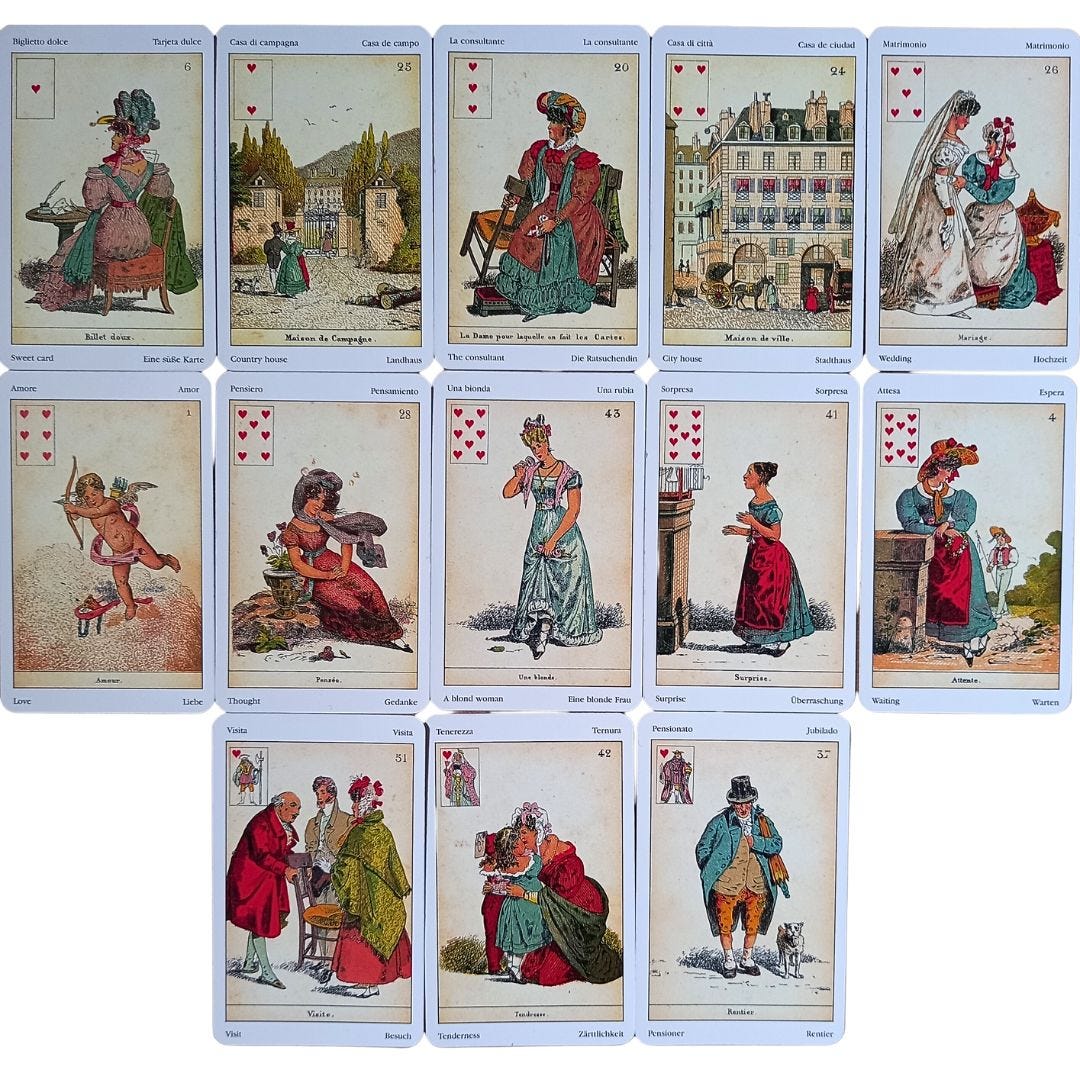Playing Card References In The Sibylle des Salons/Sibilla Indovina/Parlour Sibyl
Looking at the playing card references on the Sibylle des Salons & Indovina
Some oracle decks, as you’ll have noticed, have playing card references, which you can use to add to your readings. The main decks which do are the Vera Sibilla, the Sibylle des Salons or Sibilla Indovina, the Lenormand (sometimes) and the Gypsy Witch cards. Here, we’re going to start exploring the playing cards for the Sibylle des Salons or Indovina so that we can see how they might be used to enhance our readings.
Take a look at the playing card references for the Vera Sibilla here:
What you will notice VERY quickly is that the playing card references in this deck bear NO resemblance whatsoever to those in the Vera Sibilla. They are completely different systems even though they are both “Sibilla” decks. And even when the oracle cards and their images are clearly equivalent in meaning across those two decks, they can have wildly different playing card references.
Again, this underlines the point that there really is no ‘universality’ when it comes to playing card meanings, and there certainly wasn’t across Europe in the 19th century. There are BIG differences between Germanic, Italian and French interpretations, for instance. I have seen cartomancy systems which broadly follow these French meanings (eg in The Fortune Teller by Louisa Lawford), and others which are closer to the Austro/Italian meanings, which tend to be a little closer to what you’ll see in the Tarot minor arcana, although not always (and when you get to Lenormand, they are completely different again! For example, the Lenormand Clubs, rather than the Spades, are the “doom and gloom” suit. They follow a more regional Germanic/Bavarian set of meanings).
Moreover, in the Sibilla Indovina version, the cards themselves are actually numbered entirely differently than in the Sibylle des Salons version. One deck numbers the cards in order according to their suits, the other has a different order entirely. No idea when this change occurred; I’m guessing when the production of the deck switched manufacturers. But the playing card references for the cards in both versions are, thankfully, the same.
Anyway. You will find, unsurprisingly, that the Sibylle des Salons cards broadly follow the most common French playing card meanings that seem to be apparent in the literature of the era.
Here’s how it breaks down.
Hearts: Emotion, Family & Personal Relationships
The usual, this; this (aside from the Pensioner, but he does, I guess, provide stability) is what you’d expect from the Hearts. Emotions, personal relationships, romance.
A: Sweet Card (Billet Doux): Love letter, sweetness
2: Country House (Maison de Compagne): Relaxation, getting away from it all, holiday
3: Female Consultant (La Dame pour laquelle on fait les Cartes). Main female.
4: City House (Maison de ville) Home, family, security, structure, or building.
5: Wedding (Mariage) Marriage, bond, promise, a coming together in agreement.
6: Love (Amour): Love, romance.
7: Thought (Pensee): Thought, consideration, ideas, analysis, psyche. Imagination,
8: A Blonde Woman (Une blonde): Blonde woman, flirtation, jealousy, centre of attention attractive companion, feminine charms. or wiles.
9: Surprise (Surprise): Pleasant surprise
10: Waiting (Attente): Waiting, anticipation of something happening, expectation
11: (J) Visit (Visite): A visit, arrival, an event on its way, a face to face meeting or communication,
12: (Q) Tenderness (Tendresse): Loving woman. Affection, warmth, family love, care. Gentleness, benevolence, compassion.
13 (K) Pensioner (Rentier): A wealthy older man with a lot of material possessions and assets, who has likely had more luck in money than love, and who cares more about the material than about feelings
So as we see, essentially the Hearts in this deck are all about feelings. The one oddness, I’ve always thought, is the Pensioner. He’s a wealthy, grumpy old man, basically.
Read on to find out about the other three suits in this deck.


